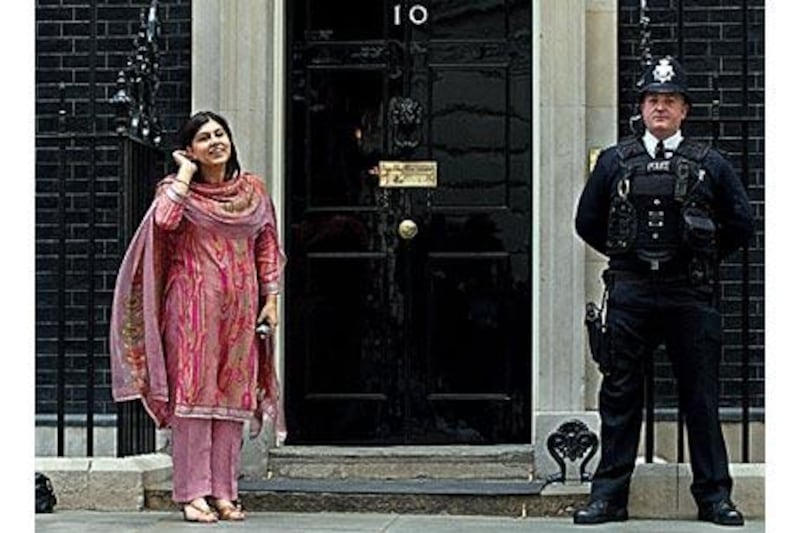LONDON // David Cameron's appointment of Baroness Warsi as Britain's first female Muslim minister has been welcomed as a "great honour" for those who share her faith and an important step in building a multicultural UK.
Lady (Sayeeda Hussain) Warsi, 39, has been made minister without portfolio after being named as the chairwoman of the Conservative Party, senior coalition partners in the UK's new administration. She describes her historic rise from a working-class childhood as a Pakistani millworker's daughter to government office as "terribly humbling". She is not the first Muslim to serve in the UK government. Shahid Malik, to whom she lost when contesting her hometown seat of Dewsbury, west Yorkshire, in the 2005 general election, broke the mould in 2007, when selected by Gordon Brown's Labour government as the under-secretary of state for international development. Last year, Sadiq Khan became the first to enter cabinet, as minister of state for transport.
But the achievement of Lady Warsi, who was named Britain's most influential Muslim woman in the Muslim Women Power List awards for 2009, is especially impressive in a country with a poor record, compared with neighbours, of choosing women for top ministerial positions. Senior British Muslims have given a warm response to her appointment. Muhammad Abdul Bari, the secretary general of the Muslim Council of Britain, said: "The appointment of Baroness Warsi as Britain's first fully fledged Muslim cabinet minister is truly historic and moving for all of us. We are all proud of her and I am sure Baroness Warsi and all other Muslim politicians will be successful role models for all of us."
Shahid Mursaleen, of the UK chapter of Minhaj ul Quran International, a Pakistani-led group campaigning for what it sees as a modern and moderate interpretation of Islam, also welcomed Lady Warsi's inclusion in government. He told Agence France-Presse the election of eight other British Muslims as members of parliament was a true indication of their contribution in the progress and development of Britain.
British media captured pictures of Lady Warsi outside the official prime ministerial residence, 10 Downing Street, following the first meeting of the Conservative/Liberal Democrat coalition cabinet. She complied with photographers' requests by hanging her coat on railings before posing, with a warm smile, in her pink-and-purple shalwar kameez. Previously, she was the first woman to serve in shadow cabinet, as the Conservatives' spokeswoman on community cohesion and social action, and was the youngest member of the upper house, the House of Lords.
Citing with approval the philosophy of Benazir Bhutto, the late Pakistani prime minister - "once you lose the fear of losing, you start winning" - she said she felt honoured and privileged to be regarded as a role model for Muslim women. "My biggest challenge is the constant question I am being asked, both publicly and privately, about my loyalty to Britain, as if somehow being British and Muslim is a conflict," she said.
"And I find it quite ironic when, certainly in my case, both my paternal and maternal grandfathers served in the British army and I say my family were giving loyalty to these shores long before they even arrived here." Sayeeda Warsi was the fourth of five daughters of parents who had emigrated from Gujar Khan. She speaks with a discernible Yorkshire accent and styles herself a "northern, working-class-roots mum".
Her attraction to the right-of-centre principles of the Conservative Party began as her father progressed from his menial early employment in Britain to launch a successful bed-making business. She graduated in law, qualified as a solicitor and joined a legal firm headed by a former Conservative MP. She has also worked in the Pakistani ministry of law, and chairs the Savayra Foundation, a Pakistani charity.
As a member of the upper parliament, she is unelected. At the 2005 general election, she trailed Labour by 4,600 votes in Dewsbury, one of the seats regained by the Conservatives this month. Her first marriage, to a cousin, produced a daughter, Aamna, now 12, "one of my biggest inspirations", but ended in divorce after 17 years. She was remarried, to Iftikhar Azam, in August. Lady Warsi has never been shy of political controversy. She won acclaim for a robust performance against Nick Griffin, the leader of the far-right, anti-immigration British National Party on the BBC television programme Question Time last year.
She also played a part in securing the release in Sudan of Gillian Gibbons, a British teacher prosecuted for naming the teddy bear of one of her pupils Mohammed. The case represented "one of those typical clash-of-civilisation moments", she said. Last November, she was pelted with eggs by Muslim protesters who claimed she "supported the death of Muslims in Afghanistan". Those responsible, she said, were "idiots who did not represent the majority of British Muslims". crandall@thenational.ae







